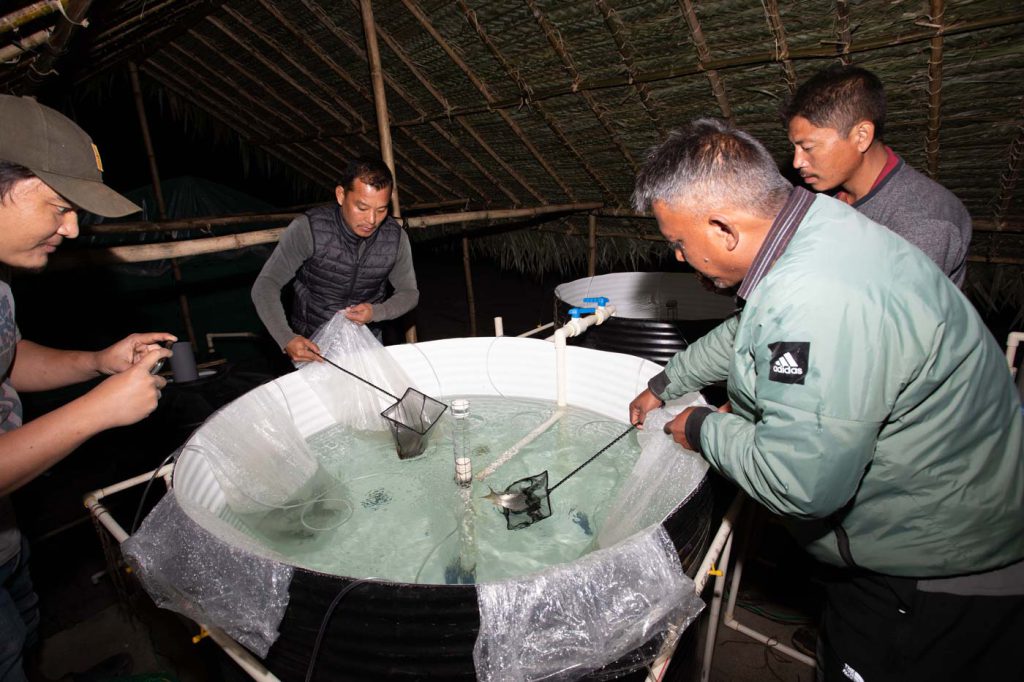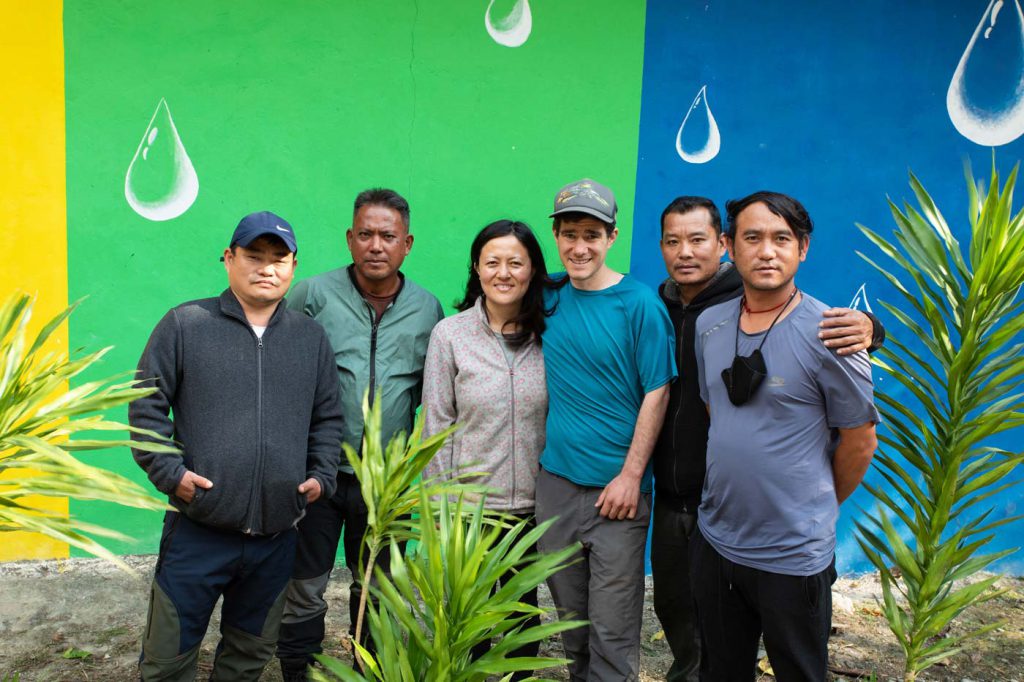Royal Manas National Park (RMNP) is home to countless valuable plant and wildlife species, including endangered animals such as tigers, one-horned rhinoceros, golden langur, Rufous necked hornbills, Asiatic water buffalo and Asian elephant, and rare migratory fish such as the golden mahseer and chocolate mahseer.

View of Gangkhar Puensum from Manas, Bhutan. Gangkhar Puensum is the highest mountain in Bhutan (7570m) and the highest unclimbed mountain in the world.
RMNP is also a hotspot for poaching due to its proximity to Indian borders that provide a gateway to illegal markets. In addition to poaching, retaliatory killing of wildlife is a major threat to conservation in Bhutan as the habitat for wildlife largely overlaps the landscapes where people live. For instance, Bhutan Tiger Center (BTC) estimates that Bhutan (and adjoining areas of India) has lost at least 19 adult tigers from 2012-2019, an enormous loss considering that there are only about 100 tigers in Bhutan.
Meeting the conservation challenge to protect keystone species such as tigers and other wildlife requires not only educating people about the importance of these species, but also providing alternative, sustainable livelihoods for people sharing landscapes with wildlife.

Asiatic water buffalo in Royal Manas National Park.
Tourism as a Sustainable Livelihood
Tourism offers one such opportunity, and Sangay Penjor, Namgay Wangchuk and Lam Dorji are three of the nine members of the River Guides of Panbang (RGP) who are pursuing this opportunity.




Jungle Lodge operated by the River Guides in Panbang.
RGP is a community-based rafting company that also runs a lodge in Panbang, a small town of about 1,600 people that lies adjacent to RMNP and is only 13 kms from the Indian border.
The RGP members have been running their tourism business for close to 10 years, contributing to the well-being of their community as well as towards conservation goals.

Namgay and Sangay getting ready for a rafting trip.
As certified White-Water Rescue Technicians, the RGP members have played a vital role in national river search and rescue missions; they have participated in curbing illegal fishing and poaching; and have engaged with their local community as well as neighboring communities across the border to conserve their rich environment.
However, the COVID-19 pandemic brought their tourism business to a grinding halt and acutely impacted their livelihoods and that of their community.
Introducing Aquaponics
As a measure to build resilience of the RGP and the community they are a part of, the Bhutan Ecological Society (BES) is pioneering aquaponic agriculture in Bhutan.

Aquaponic facility construction.
BES chose the River Guides of Panbang (RGP) as a beneficiary and partner for the aquaponic project due to their proximity to the highly biodiverse Royal Manas National Park and the area’s manifest increase in vulnerability due to the impacts of COVID-19.


Aquaponics combines aquaculture (growing fish) with hydroponics (growing plants without soil) by developing a complex agricultural ecology. Nutrient rich fish wastes are broken down by microbes into plant fertilizers, and by absorbing these nutrients, plants purify the water for fish.
Aquaponic systems can be extremely productive, yielding an abundance of vegetable crops and some fish within a small space.

For the community of Panbang, aquaponics represents a potential alternative source of income and food security. Additionally, this ecological approach to farming may improve the climate resilience of the community food supply by growing crops within greenhouses protected from the harshest conditions and pests.
“The biggest impact of the aquaponics project will be on education – it will not only raise awareness of conservation and ecology, but also teach us about a new and innovative method of farming that has never been tried before in Bhutan.
In young children, this facility will give them a visible and tangible example of the science of farming, which we have been introduced to through the BES project. More importantly, if we get this right, our project can be a game changer for agriculture and have multiple benefits, such as reducing human-wildlife conflict, saving cost on electric farming and reducing climate-induced threats to agriculture.”
– Sangay Penjor, River Guides of Panbang
“The classes and practical work of building the aquaponics facility has taught us a lot of new knowledge and piqued our interest and the curiosity of the local community. I personally feel excited, albeit a little nervous, about trying out aquaponics farming which feels more technical and sensitive than traditional farming.”
– Namgay Wangchuk, River Guides of Panbang
Building Resilient Landscapes for People and Nature
Aquaponic agriculture has not been implemented in Bhutan to date, thus the RGP aquaponics system will serve as an inspiration to the community, as well as the nation as a means to build and sustain resilient landscapes that provide for human needs and support critical ecological processes and biodiversity.
To realize that vision, the BES has been working at the forefront of sustainable development, climate change adaptation, environmental conservation and education.
Birdseye view of Panbang, adjacent to the Royal Manas National Park.
For instance, in Norbugang, a community neighboring Panbang, BES has aimed to inspire conservation of tigers and their prey by offering Buddhist teachings and livelihood enhancements (electric stoves, fencing and other farm equipment) that cultivate a more compassionate perspective towards wildlife.
In Chuzegang, another southern town close to the RMNP, BES has been expanding the production capacity of moringa, a fast growing, drought-resistant plant that is nutritionally dense and has multiple uses, to improve rural livelihoods and enhance the climate resilience of these communities.
Similarly, through our Million Trees Project, BES aims to plant one million timber and fruit trees in fallow lands across Bhutan to promote sustainable rural livelihoods, while keeping Bhutan at the forefront of carbon negative development.
The RGP members see multiple potential benefits from the aquaponic project – the facility will be an added attraction for visitors, they will be able to serve fresh vegetables and herbs from the aquaponic farm to their guests, and they could expand to commercial production that caters to the local community which struggles to grow sufficient fresh vegetables, especially during the summer monsoon season.
“Although we are working with cultured fish as the moment, I look forward to a time when we can work with local fish in our aquaponic facility, which will add to the attraction at the Jungle Lodge and also increase knowledge of local fish and aquatic life.”
– Lam Dorji, River Guides of Panbang

All of these outcomes facilitate the conservation of the local natural environment by providing ecologically-conscious livelihoods that do not depend upon unsustainable extraction from natural areas.
In the future, aquaponics could be implemented more widely in Bhutan to reduce human-wildlife conflicts, overexploitation of natural areas, promote climate resilient livelihoods and serve as an educational tool for ecologically-conscious living.

Notes:
The aquaponics project proposed by BES was one of the nine successful recipients of grants from the ‘Covid-19 Response: Resilience in Wildlife Communities’ from the The Lion’s Share, and the Global Environment Facility’s Small Grants Programme under UNDP. It was selected from over 1,600 proposals by organizations across 106 countries.
Photos: © Joshua F. Goldberg
A version of this story is also available at: Like water for tigers (shorthandstories.com)
